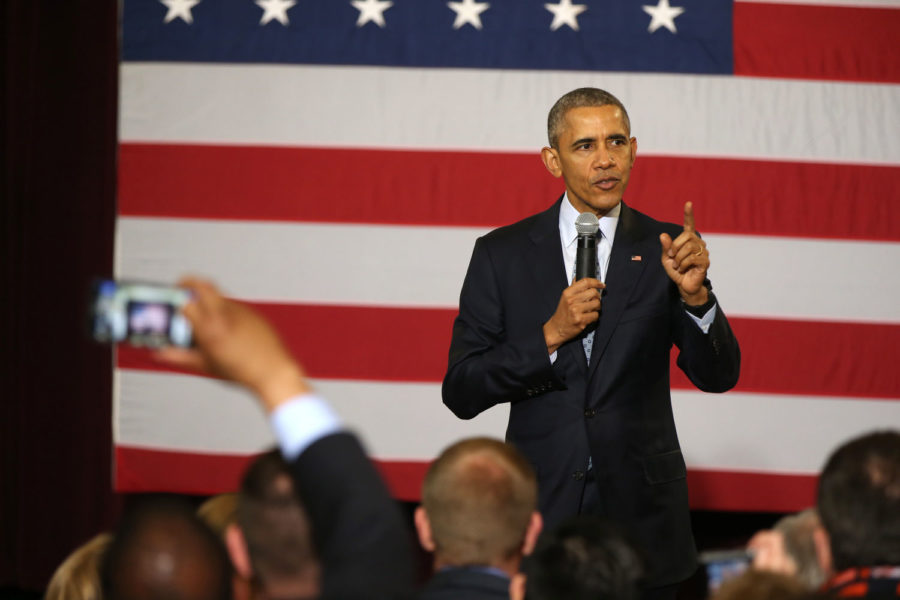Pain pill industry gives $5.15 million to Illinois politicians
President Barack Obama stops at the Hoogland Center for the Arts in Springfield following his speech at the Illinois State Capitol on Feb. 10. (TNS)
September 19, 2016
From 2006 to 2015, U.S. Rep. John Shimkus, R-Collinsville, received more than $290,000 in campaign contributions from the Pain Care Forum, a collection of pharmaceutical companies and other industry groups.
The forum, which consists of drug makers and opioid-friendly nonprofits, aims to influence proposed regulations on opioids and promote legislation and reports on the problem of untreated pain.
Shimkus is one of many politicians from Illinois who have accepted more than $5.15 million in contributions from pharmaceutical companies and their allies since 2006, an investigation by the Associated Press and the Center for Public Integrity found.
Advertisement
Shimkus, who has been in Congress since 1997, said his longevity is a factor on why he’s received a higher amount than his colleagues, and added it takes money to run a campaign.
“When you do the overall aggregate amount that seems like a lot,” Shimkus said. “In the primary we spent $1 million.”
But he said the contributions haven’t influenced how he votes on opioid-related legislation.
“It’s illegal to tie contributions to a vote,” Shimkus added. “It’s never been done by me.”
He said he has had a constituent with chronic arthritis who visited during open office hours. The condition cannot be healed, but only managed, and limits on how much opioids she can receive could hinder her ability to manage the pain.
“She was pleading with me not to have the pendulum swing so much it would be difficult for her,” Shimkus said.
He acknowledged there can be opioid abuse, but said there can be a balance, such as more training and education. The country also has to be careful about not interfering too much in the doctor-patient relationship, he said.
Advertisement*
“There is a concern from people who have chronic pain that we would over react, (and) they would lose the medication they need to live a somewhat normal life,” Shimkus said.
The forum’s donations
The Pain Care Forum, a group of pharmaceutical companies and groups associated with them, made 3,545 contributions in the past 10 years to Illinois politicians. That’s compared to just three contributions by Public Citizen, a group that favors more prescription drug regulation, which spent just $1,891.
The contributions touch nearly every federal and statewide political office in Illinois and coincide with a 25 percent increase in prescription drug overdoses in the same time period.
Industry groups gave irrespective of political party, though the average size of their donations varied widely. Democrats received about $2.4 million, and Republicans received about $2.7 million.
The average donation to Democrats was about $1,200, and the average donation to Republicans was about $1,800. Despite this, Illinois has seen a nine percent drop in the number of prescriptions from 2013 to 2015, and, last year, doctors wrote 0.62 prescriptions for every person in the state.
That put Illinois in 41st place for the number of prescriptions for 2015, below the national average of 0.71 prescriptions per person and follows the declining national average of overall opioid prescriptions.
Prescription drug-makers, which include a handful of Chicago-area companies, spread $4.5 million among state and federal candidates, as well as state parties, while industry groups, like law firms, spent almost all of its nearly $700,000 in donations at the federal level.
The single largest campaign contributor to Illinois politicians was Abbott Laboratories, a Chicago-based drug manufacturer, which gave $1.5 million over the past decade. Among the metro-east politicians to receive contributions from the Pain Care Forum:
— James Clayborne, Democratic state senator, received $21,250
— David Luechtefeld, Republican state senator, was given $9,750
— Michael Bost, Republican U.S. Representative, received $8,750
— Jay Hoffman, Democratic state senator, received $4,500
— Jerry Costello, former congressional Democrat, got $2,000
Even President Barack Obama got in on the action when he took $9,650 in 2006, when he was a U.S. senator.
Of its $5.15 million, the Pain Care Forum spent $2.8 million just on state-level politicians, and since 2006, the Pain Care Forum has employed an average of 63 registered lobbyists who work at the statehouse in Springfield.
Since 2006, 12,903 people have died of opioid overdoses.
Legislative action
The U.S. House of Representatives did pass opioid reduction legislation earlier this year. It is awaiting action by the U.S. Senate.
The legislation, if ultimately signed into law, would enhance collaboration between criminal justice and substance abuse agencies, develop or expand programs to prevent, treat or respond to opioid abuse, train first responders to administer opioid overdose reversal drugs, help create veteran treatment courts, peer-to-peer services, and treatment of veterans, among other things.
U.S. Rep. Mike Bost, R-Murphysboro, said the bill, which passed the House 413-5, was the product of a task force that included doctors and nurses.
“It was a bipartisan bill,” Bost said. “It (opioid abuse) is a real problem to try to figure out.”
State Sen. Dave Leuchtefeld, R-Okawville, who is set to leave office in January, said he doesn’t pay attention to who gives him money. Pharmaceutical companies giving, or any donors giving, are looking for access, Leuchtefeld said.
“There’s nothing necessarily bad about access,” Leuchtefeld said. “A lobbyist can tell you about the good and hopefully the bad of a bill. They do serve a purpose. They want to talk to you and convince you how to vote. The real intent is simply have the ability to call you and knock on the door and say ‘can we talk?'”
Leuchtefeld said most legislators wouldn’t know what the limits should be for opioid prescriptions.
“The average legislator doesn’t have a clue how much you should use. They need experts, doctors who can advise you on that,” Leuchtefeld said. “When it comes to drugs and the amount you should (prescribe) and limits you should have, you better get someone who knows what they’re talking about.”
Illinois recently enacted laws to help combat opioid addiction, including preventing judges from barring doctors from prescribing courts medication, such as methadone, to treat opioid addiction.
Beginning next year, substance abuse programs licensed by the Illinois Department of Human Services will have to provide educational information on medication-based treatments and the use of anti-overdose drugs. Both pieces of legislation passed both chambers of the General Assembly unanimously.
“I hope I haven’t been affected by money in this business,” Leuchtefeld said. “I don’t think I have.”
Legislators last year, while overriding a Gov. Bruce Rauner veto, voted to allow the state’s Medicaid program to fully cover heroin addiction treatment. Leuchtefeld voted against the override.
Despite these donations, State Rep. Lou Lang, a Democrat from Chicago and a major force behind bills fighting opioid and heroin addiction, also advised against seeing donations as a quid pro quo exchange between interest groups and politicians.
“Some of the people and groups that make donations may have a point of view on a particular issue, but my experience is that, most of the time … anyone that makes a campaign donation is (trying to) create a relationship where they have an open door,” he said.
Lang, who received $29,800 from the PCF, said he would be naive to say that all contributions are agenda-free, but with regard to his own effort to expand prevention and treatment opportunities, “I haven’t seen where it’s happened in this area,” he said.
For example, the Heroin Crisis Act, which he wrote, passed the House unanimously. And the Senate unanimously approved an expansion of the medical marijuana, which has contributed to a reduction in opioid abuse in other states where it has passed.
The Senate bill added “debilitating medical condition” to the list of accepted reasons for medical marijuana. Opioid addiction, however, did not survive negotiations to be considered a debilitating medical condition.
The Associated Press contributed to this article.
___
(c) 2016 the Belleville News-Democrat (Belleville, Ill.)
Visit the Belleville News-Democrat (Belleville, Ill.) at www.bnd.com
Distributed by Tribune Content Agency, LLC.
Advertisement










